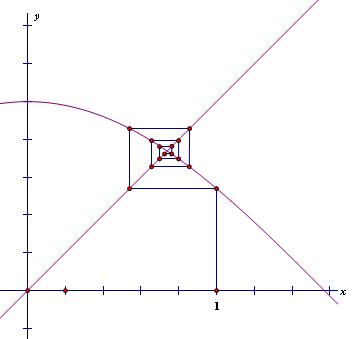We first prove that {bn} is a convergent sequence.
We have
|b_{n+1}-b_n| = |\cos b_n - \cos b_{n-1}| =2 \left|\sin \left(\frac{b_n-b_{n-1}}{2} \right) \right| \left|\sin \left(\frac{b_n+b_{n-1}}{2} \right) \right|
Now, its obvious that for all n>1, b_n < 1
Hence \left|\sin \left(\frac{b_n+b_{n-1}}{2} \right) \right| < \sin 1
Also \left|\sin \left(\frac{b_n-b_{n-1}}{2} \right) \right| < \left|\left(\frac{b_n-b_{n-1}}{2} \right) \right|
From the above, we have |b_{n+1}-b_n|< |b_n-b_{n-1}|\sin 1 and hence |b_{n+1}-b_n| < |b_1-1| \sin^{n-1}1
That means |b_{n+1}-b_n| may be made as small as we please and hence {bn} is a Cauchy sequence which is convergent say to l.
Hence we have that l satisfies the equation l = \cos l. (or you can similarly argue that y_n = x_n - \cos x_n converges to 0)
Since f(x) = x - \cos x is monotonic in (0,1), and f \left(\frac{\pi}{6} \right) >0 and f \left(\frac{\pi}{4} \right) <0, there is a root lying in \left(\frac{\pi}{6},\frac{\pi}{4}\right) which fits Option D.
This is in fact the general procedure for finding fixed points of f(x), i.e. solutions for f(x)=x for continuous f
See http://en.wikipedia.org/wiki/Fixed_point_iteration which in fact gives this problem as example #2. Also if you follow the link on Banach fixed point theorem, you will see that the proof here is constructed on similar lines as the one given on that page.
